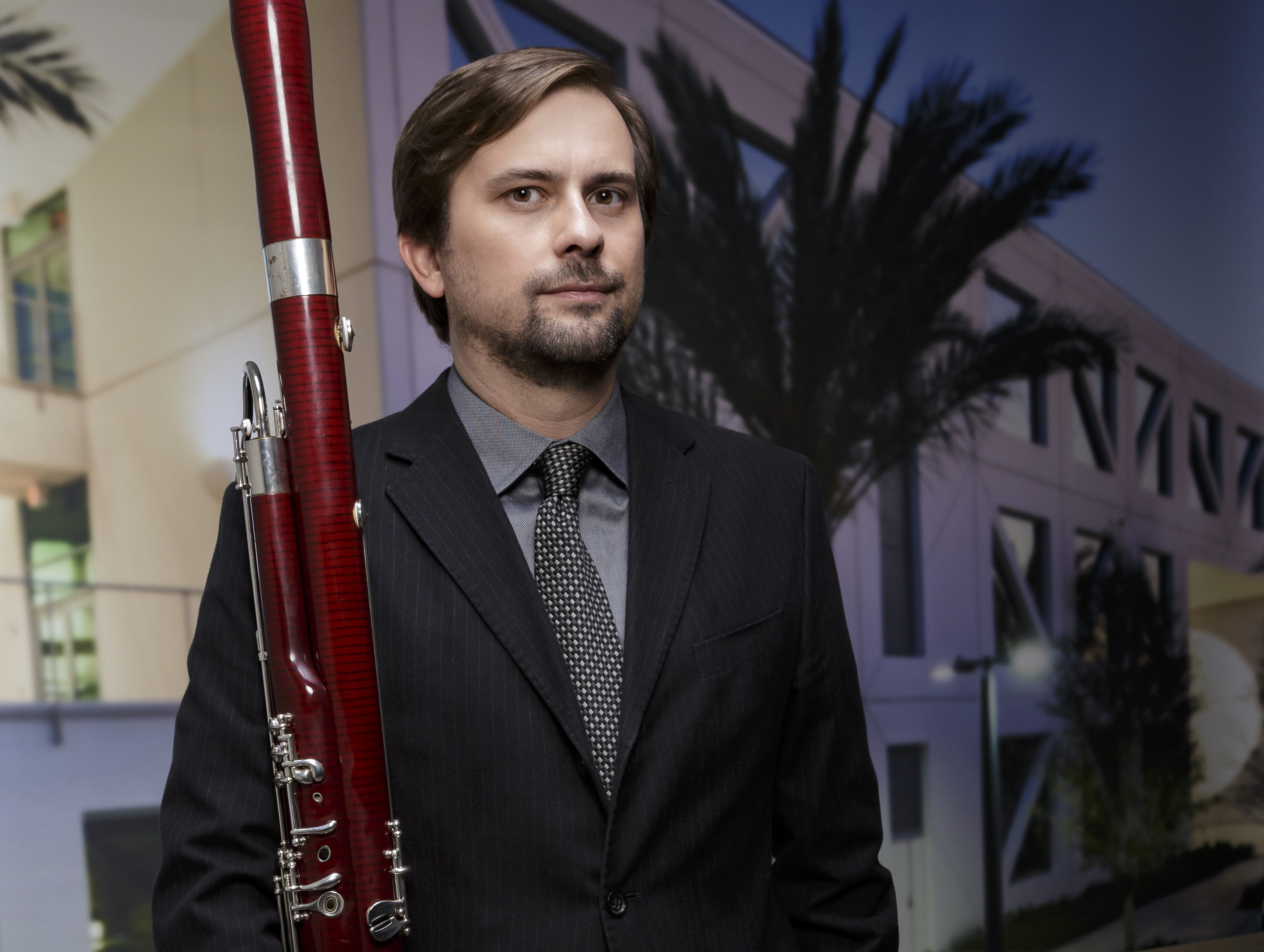An Interview With Nu Deco Bassoonist Gabriel Beavers
By Zach Manzi
I met bassoonist Gabriel Beavers at my very first Nu Deco rehearsal. He sits right next to me and together, as low-woodwind partners-in-crime, we have played countless baselines in unison along with the occasional flashy moment. Gabriel has been one of the most dedicated musicians in the group since day one. With the exception of only one show, he’s actually played in every single Nu Deco concert to date. With a background in orchestral music as a New World Symphony alum and former Principal Bassoon in the Baton Rouge Symphony Orchestra, Gabriel loves exploring genre-bending music that fuses classical music with other styles. Although he might name other bassoonists who are as adventurous as he, I don’t know many who have commissioned, premiered, and recorded so many new works with such gratitude and fervor for exploratory musical styles.
From his youth as a church pianist in Northern Alabama to his current position of Professor of Bassoon at the University of Miami’s Frost School of Music, it seems as though Gabriel had always been preparing to be part of a group like Nu Deco.
Z: Hey Gabriel, so I’m super interested in knowing is how you became one of the original members of Nu Deco. Can you tell me the story of how that happened?
G: Sure! So I used to be the tenured Principal Bassoon at the Baton Rouge Symphony (BRSO) and the Professor of Bassoon at Louisiana State University (LSU). I resigned my job in BRSO and moved to Miami when I accepted the full time Professor of Bassoon job at Frost. I knew there would be enough opportunity here to play, but what I didn’t know is that I would miss this feeling that comes with being an actual member in a group instead of the hired help, so to speak. I mentioned this to Craig Morris, the Professor of Trumpet at the Frost, where I’m the Professor of Bassoon. I was like, I miss having my orchestra where I’m the Principal Bassoon. Craig was like, I think I have something for you. So, Craig mentioned my name to Sam Hyken, and I got invited to this pitch for local musicians about this group they’d started, which was Nu Deco. Around the same time, I had also commissioned a piece by Robert Bradshaw for amplified bassoon, string quintet, and percussion, and I’d hired a group of musicians that included Sasha Zhuk, Karen Powell, Yael Hyken, and Aaron Merritt to play it with me. It turned out they also became initial core members of Nu Deco. I went to the pitch. Sam was so dynamic, playing clips of different ideas he had for pieces. It sounded like a cool Miami meets Alarm Will Sound meets chamber orchestra. We all volunteered to do a promo video, and then an initial concert, and the rest is history!
Z: That’s awesome. It seems like you’re playing a lot of new music, even outside of Nu Deco. I know you mentioned the piece you commissioned, but are there others?
G: Yeah, I commissioned a work by Charles Norman Mason for amplified bassoon and brass quintet, which I just recorded last fall. It’s on an album that’s going to be released soon, and it’s also with that initial piece I mentioned. One of my previous albums, A Quirky Dream, was all music written for me. I got a grant to hire the Henry Mancini Institute Orchestra to record one of the pieces with me. Actually, Abby Young, who was the personnel manager and concertmaster of that orchestra at the time, has a big violin solo on that album. I can’t necessarily claim the “new music chops” that some musicians have, but I got into being a full-time professor understanding that my job is to create content, to help bring new things into the world and not just teach how to play the Beethoven excerpts, although that is a big part of my job too. I need to usher new things into the world, that’s what being a professor is. I was really scared of new music coming from my classical background, I have to tell you. But I’ve seen that it doesn’t necessarily have to be unapproachable or so avant-garde that it’s an acquired taste. It can be music that really excites you. I find a lot of excitement in colleagues and friends writing music for me. And I think that’s also what we do at Nu Deco.
Z: You know, you said that you may not have the “new music chops” that other people do, but it seems like you do! From generating the new work, to premiering, recording, and putting it out there. So my next burning question is––why amplified bassoon?”
G: First, I have a plug for a recital on February 11, 2020 at Frost School of Music. That night is going to explore the answer to your question about my journey with amplified bassoon. But for now, there are two reasons. First, I grew up in North Alabama, and before I became a bassoonist, I played piano in my high school’s jazz band. (I also made money to pay for bassoon lessons by playing piano in a local church. They paid me $25 every Sunday, and I took that money and gave it to my bassoon teacher.) On piano, I jammed with a friend who is quite an accomplished guitarist. I had a real interest in Eric Clapton, and BB King, and the blues and rock, in addition to absolutely loving classical music. I just didn’t see a conflict there. I’ve never met Eric Clapton, but I would be over the moon if I could jam on the bassoon with him. So when I asked Rob Bradshaw to write that piece, I had just started teaching at Frost, and I knew it was a place that was friendly to classical musicians openly embracing other styles. Bradshaw was the one who suggested using electric guitar pedals to modify the sound. So that was one side, my interest in rock and blues. The other side of it was just being a frustrated orchestral bassoonist who was tired of being covered up by the brass. For years, I had been telling composer friends that I wanted a piece for bassoon that can compete with the brass, sort of show them up a bit. I finally whispered in the right composer’s ear that their music could work for that––Charles Norman Mason, my colleague at Frost who is a Prix de Rome-winning composer. The piece he wrote is called Swagger, and he said it’s called this because a bassoonist has to have swagger to stand up in front of a brass group and play a solo.
Z: All I can think right now is that it sounds like you were the perfect bassoonist for Nu Deco to stumble upon. What you just described is kind of the philosophy behind the ensemble, right?
G: It is, and it’s weird. I set out to be an orchestral bassoonist. I was a Bassoon Fellow in New World Symphony, and I still sub with orchestras and play principal with local groups. Nu Deco is an orchestra, but I mean the traditional 19th-century incarnation of an orchestra. I never want to give that up, but ironically I felt that I had kind of tamped down these parts of myself in an effort to be employable as a bassoonist. I’m still pretty open with my students about that, too. You have to be able to play in a certain style to be successful in the orchestra world. But I think the world is opening up a little bit now. I didn’t come from a super wealthy background, so I needed to make a living and kind of tailored myself to employability as a bassoonist. A college teaching position opened me up to not having to worry about that as much, and then Nu Deco came along and kind of allowed me to embrace and enjoy it. There’s still more I can do, but I’m enjoying just getting to live out that other part of me that really enjoys not just playing Beethoven. I could listen to Beethoven all day on repeat and it wouldn’t be time wasted, but I love both. I didn’t know I was the right guy for Nu Deco, let’s put it that way. What’s interesting, though, is there’s a whole generation of young folks who are embracing this kind of openness.
Z: Yeah, I definitely see that some people my age playing in symphony orchestras are also doing other things, and that’s cool. I have one more question for you, and because you’ve played in so many concerts, it may take you some time, or not! I’m wondering what your favorite Nu Deco moment to date has been.
G: Ah, man. I think the thing I’m the most proud of is the Kishi Bashi collaboration on his exploration of the executive order that interned Japanese-Americans. It felt like a very relevant thing to the moment we’re living in right now, and a contribution we can make to awareness at a time when xenophobia is high, with what’s going on. Even though this is something we can read about on Wikipedia, I’m proud for being a part of him bringing it alive in art. So that’s probably going to be my most memorable thing, but we’re still making new experiences. This Wyclef Jean thing was amazing. Wyclef is emblematic of so many of our guests––they’re great musicians and sometimes that’s not the credit given to people who do other types of music in the classical world. This guy has a great mind about music, and to see it put on display and sharing us with his audience. That feels really special. We’re bridging some kind of gap, and that’s pretty awesome too.
Z: Cool. Well, that’s all I have for you. Thanks for taking this time, Gabriel, and I’ll see you soon!
G: See you soon.


